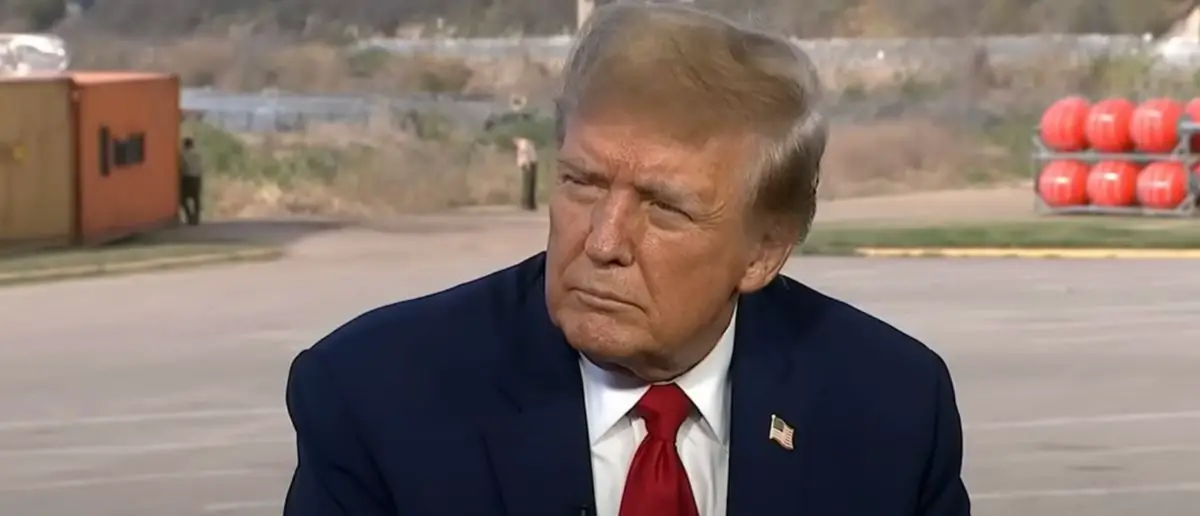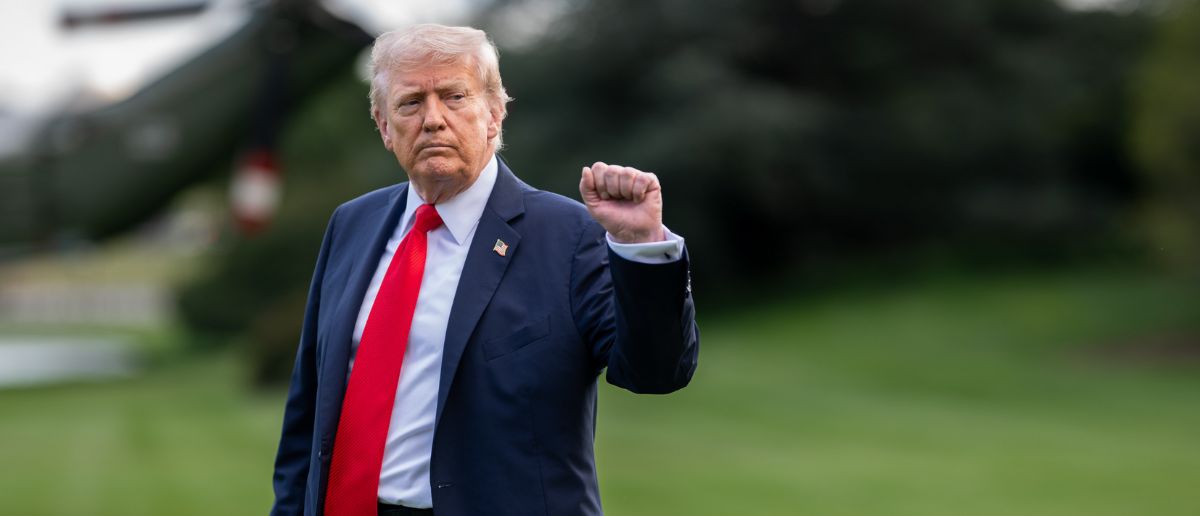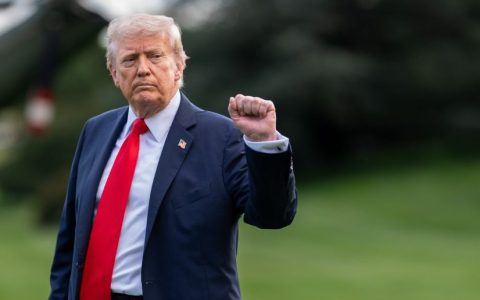
The Trump administration has already shut down the southern border. But that’s not enough for them.
Now President Trump’s startling plans for Mexico have leaked to the press.
Trump’s Relentless Crusade to Smash Mexico’s Drug Cartels
President Donald Trump has intensified his campaign to confront Mexico’s drug cartels head-on, seizing a moment of vulnerability as these criminal enterprises grapple with internal chaos and a fortified U.S. military presence at the southern border. The cartels, once untouchable, now face a reckoning.
The situation in Mexico has reached a boiling point, with cartels like the Sinaloa and Jalisco New Generation locked in brutal power struggles. Trump’s response has been unwavering: he’s pushing for direct action, including offering U.S. military support to Mexican President Claudia Sheinbaum. While Sheinbaum has resisted, Trump’s insistence reflects a belief that now is the time to strike decisively against these criminal empires.
Sheinbaum revealed over the weekend that Trump personally extended an offer of American military assistance. “How can we help you fight drug trafficking? I propose that the United States military come in and help you,” she quoted him as saying. Her response was a firm rejection: “And you know what I said to him? ‘No, President Trump.’” She emphasized that Mexican “sovereignty is not for sale” and proposed cooperation on separate terms, stating, “we can work together, but you in your territory and us in ours.”
Trump, undeterred, confirmed the offer on Monday, sharply criticizing Sheinbaum’s stance. “She is so afraid of the cartels she can’t even think straight,” he said. His blunt assessment resonates with those who see Mexico’s government as overwhelmed by the cartels’ grip, unable to fully confront the chaos engulfing cities like Culiacán.
The last time American troops entered Mexico for combat was in 1916, when Brigadier General John J. “Blackjack” Pershing led a 10,000-strong force in pursuit of Pancho Villa after his attack on Columbus, New Mexico. That mission, which ended in 1917 without capturing Villa, serves as a historical reminder of the complexities of cross-border operations. Yet, Trump’s current strategy suggests a willingness to revisit such bold measures, tailored to today’s crisis.
Senior administration officials are amplifying Trump’s call for action. Ron Vitiello, a senior adviser at U.S. Customs and Border Protection, urged Sheinbaum to seize what he called a “once in a lifetime opportunity” to dismantle the cartels. Vitiello’s optimism is fueled by recent cartel infighting and admissions from their own ranks, which point to a rare moment of weakness in their operations.
🚨 PRESIDENT TRUMP: “The President of Mexico is a lovely woman, but she is so afraid of the cartels that she can't even think straight.”
Trump should send in the U.S. military to take out the cartels. Enough is enough.
Too many Americans have been kiIIed pic.twitter.com/xJbfFYecPr
— Nick Sortor (@nicksortor) May 5, 2025
Mexico’s drug cartels have long operated as shadow governments, carving out fiefdoms where their authority often surpasses that of the state. In regions dominated by groups like the Sinaloa Cartel, which controls much of the U.S.-Mexico border, or the violent Jalisco New Generation Cartel in central Mexico, the Mexican government struggles to assert control. The Juárez Cartel, though diminished, still vies for influence, adding to the fractured landscape.
The Sinaloa Cartel, in particular, is reeling from internal strife following the 2024 arrests of Ismael “El Mayo” Zambada and Joaquín Guzmán López, son of the infamous “El Chapo.” The resulting power struggle between the Mayos and Chapos factions has turned Culiacán into a battleground, with violence so severe that schools cancel classes after outbreaks, as reported by the Associated Press. The city has recorded at least 1,200 deaths and hundreds of missing persons in the past year alone.
A rare glimpse into the cartels’ vulnerability came through a CNN interview with a masked Sinaloa Cartel member in Culiacán. Describing the city’s descent into chaos, he admitted, “Right now, all areas are dangerous.” When asked about the impact of Trump-backed crackdowns, he conceded, “They’re doing a good job,” noting that intensified enforcement has forced the cartel to operate on a smaller scale. “There are more of them [enforcement actions] now, so we have to find a way to keep doing this, to keep working. Of course, on a smaller scale, not the same as before. But it continues,” he said.
Local voices in Culiacán credit Trump’s pressure on Mexico City for tangible improvements. Miguel Calderón, a resident, told CNN, “That pressure [from the Trump administration] has translated into tangible results here, into better coordination that translates into all these issues of inhibiting criminal activity, especially its firepower.” He added, “If it weren’t for federal forces and all this military support from the national government, the problem would be two or three times worse.”
The Sinaloa Cartel member’s view of Trump was strikingly candid. When asked his opinion, he offered a single word: “Respect.” He elaborated, suggesting Trump is “working to take care of his own people.” However, he pointedly noted, “But the problem is the consumers are in the United States. If there weren’t any consumers, we would stop.” This admission reveals the complex interplay of supply and demand driving the crisis, with Trump’s policies targeting the supply side with unrelenting focus.
Beyond Sinaloa, the Jalisco New Generation Cartel is exploiting the chaos to expand its reach. The U.S. Treasury Department recently sanctioned the group for its role in fuel theft and drug trafficking, which have become lucrative revenue streams. Treasury Secretary Scott Bessent described these activities as “cash cows for the [Jaliscos’] narco-terrorist enterprise, providing a lucrative revenue stream for the group and enabling it to wreak havoc in Mexico and the United States.”
Fuel theft, in particular, has emerged as a sophisticated operation, with cartels siphoning oil from Petróleos Mexicano and funneling profits through international buyers. The Jaliscos’ long-standing rivalry with Sinaloa, including past abductions of El Chapo’s sons, underscores the volatile dynamics at play, which Trump’s administration views as an opportunity to disrupt their operations.
Trump’s aggressive posture builds on earlier Republican efforts to confront the cartels. In 2023, Senators Lindsey Graham and John Kennedy proposed legislation to designate cartels as terrorist organizations and authorize military force. Graham declared, “We’re going to destroy their business model and their lifestyle because our national security and the security of the United States as a whole depends on us taking decisive action.” He emphasized the need for a multifaceted approach, stating, “It’s time now to get serious and use all of the tools in the toolbox. Not just in the prosecution lane, not just in the law enforcement lane, but in the military lane as well.”
The Biden administration’s reluctance to pursue such measures left the cartel problem to fester, paving the way for Trump’s campaign to resonate with voters by prioritizing border security and cartel designation as terrorist groups. Trump acted swiftly, designating the cartels as terrorists in February, a move that has set the stage for his current push for direct intervention.
Recent congressional support has bolstered Trump’s approach. In March, Rep. Dan Crenshaw of Texas urged immediate action, stating, “[t]he time is now to take the fight to the cartels.” His call aligns with Trump’s strategy, which leverages military buildup, diplomatic pressure, and targeted sanctions to weaken the cartels’ grip.
Stay tuned to the DC Daily Journal.





